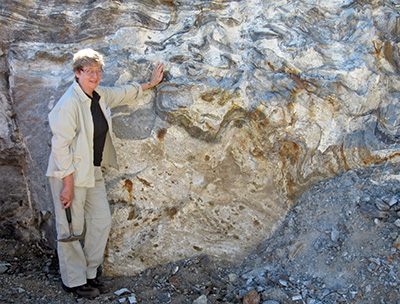
Director's Preface
This report summarises the activities and achievements of the Australian Research Council Centre of Excellence for Core to Crust Fluid Systems (CCFS) in 2014 (commenced mid 2011). Activities include research, technology development, stakeholder engagement, international links and research training.
The overarching goal of CCFS is to understand Earth’s internal dynamics, evolution and fluid cycles from core to crust. CCFS multiplies the capabilities of three national centres of research excellence in Earth and Planetary Sciences: Macquarie University (Administering Institution), Curtin University and the University of Western Australia (Collaborating Institutions). The Geological Survey of Western Australia is a Partner Institution and researchers from Monash University and the University of New South Wales are formally affiliated. Our strong formal international partnerships and growing networks leverage our resources across intellectual, infrastructure and funding bases.
The formal ARC Mid-Term Review and Site Visit were major features of 2014. The preparations confirmed the strong collaborative and collegial spirit that has developed across researchers within CCFS at all levels and showcased the world-leading scientific outcomes and impact of the research program. The ARC Report from the Review Panel (Professors Martin Hand and Brian Yates and Dr Erica Smythe) emphasised the transformational research that had resulted, and praised the global recognition, the culture of the Centre that encourages exploration of innovative ideas, its mentorship at all levels, its governance and its leadership, illustrated by the following excerpts.
“The Centre is building critical mass of PhD students and postdoctoral researchers … working collaboratively across disciplines. The Panel views this capacity building as one of the Centre’s strengths and lasting legacies, and a major advantage for Australia”
“The Centre is undertaking original, innovative and transformational research and is making important advancement of capabilities and knowledge … [and has] achieved important breakthroughs in geoscience research (e.g. new synthesis of early Earth tectonics, and identification of both cubic Mg-silicates in peridotites in Tibet and the slab roll-back mechanism to extract material) … The Panel found the Centre’s 3-D/4-D work particularly transformational … and considered this work as the most exciting, interdisciplinary and cross-functional part of the Centre’s program.”
“The Centre’s research is innovative and is generating interest in the research community … one example being the Centre’s interpretation of lower crust formation … the paper has had over 6000 downloads.
“… the Centre Director was … a fantastic mentor for personnel across the nodes and experience levels, was accessible, provided invaluable guidance and experience, … whose leadership was critical to the Centre. The Centre Director was seen as having an overarching view of the Centre, as an effective communicator and a leader who brings people together.”
“Nationally, Centre researchers are being recognised for the excellence of their research, with a number receiving research support through competitive schemes for commencement in 2013 and 2014, including ARC Discovery Projects, Future Fellowships … as well as non-ARC awards”
2014 was also a year of review and program restructuring to identify the most productive research directions relevant to fulfilling the CCFS vision of "Delivering the fundamental science needed to sustain Australia’s resource base." All the research programs were scrutinised, reassessed and realigned (following advice from the Science Advisory Committee).
This resulted in 7 Flagship Programs (see p. 20) based on the benchmark outcomes of the first 3 years and extending in new directions; programs that had come to fruition in the first three years were finalised. These Flagship Programs will target the research goals through to 2018, providing a new focus and realigned strategies to deliver more transformational outcomes and leave a legacy in knowledge, new technology and methodologies, and vital new knowledge about Australia’s geological evolution to guide smart new mineral exploration. They are underpinned by two Technology Development Programs designed to deliver more leading-edge geochemical breakthroughs, capitalising on the outstanding geochemical instrumental infrastructure across CCFS.
The continuing success in gaining external leverage of resources is exemplified by the award of two more Future Fellowships to David Wacey and Xuan-Ce Wang - a total of nine Future Fellowships have been awarded to researchers in CCFS. The postgraduate cohort keeps burgeoning with 73 PhD students undertaking research aligned with CCFS. The success of strategies to encourage and mentor early- and mid-career researchers is evidenced in the “Participants” Section and was highlighted in the Review Report.
Our postgraduates are producing world-class research with authorship of 28 publications in high-impact journals in 2014 and 53 presentations at peak international workshops and conferences. Beñat Oliveira deserves particular mention not only for being awarded the prestigious La Caixa Spanish scholarship for study in a foreign country, but also for his top ranking in that cohort.
The Research Highlights section again showcases the outstanding research in CCFS, reflected in the 2014 outputs including publications. Following from our reflections for the mid-term Review about the scientific and stakeholder impact of CCFS research, and new knowledge contributions to understanding the Earth on which we live, 2015 is starting with high energy in the exciting new research framework defined by its Flagship Programs.
We are eagerly anticipating building on our fundamental knowledge expansion and new tools from our successes in the first three years, to further explore Earth’s inner space and workings since its formation over 4.5 billion years ago. The ultimate goal is to continue to lead the way to Australia’s future mineral security, ensuring economic health for our society through fundamental, high-impact research discoveries.
Professor S.Y. O’Reilly

Participants at the CCFS Research Meeting, 3-4 July 2014.

 ARC Centre of Excellence for Core to Crust Fluid Systems
ARC Centre of Excellence for Core to Crust Fluid Systems